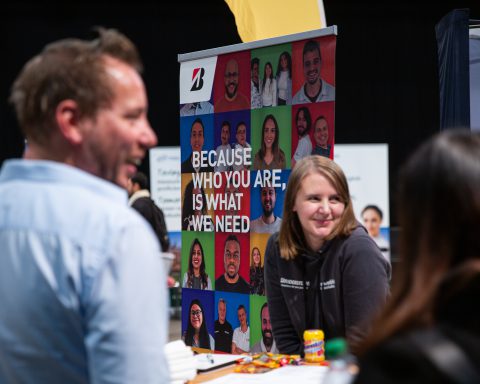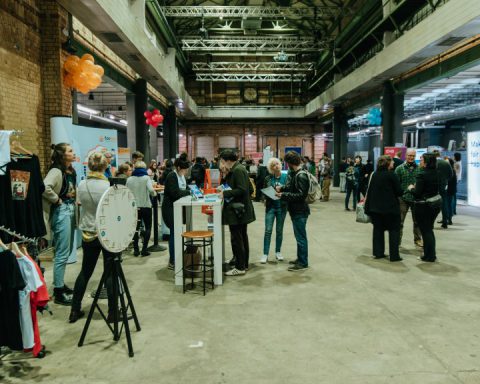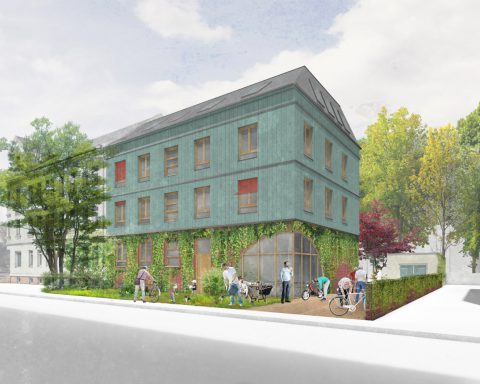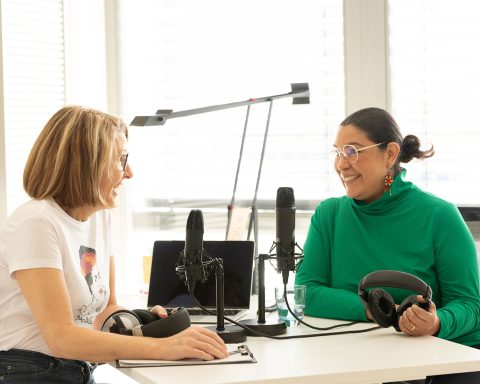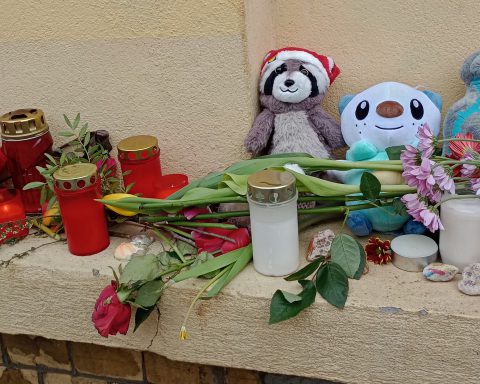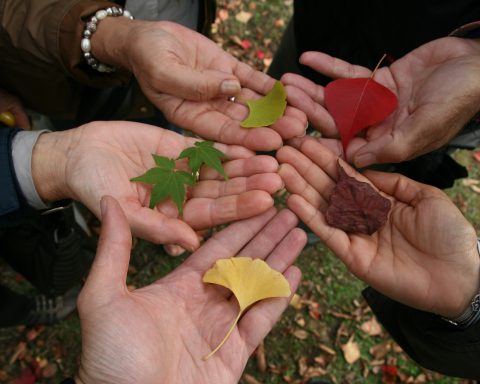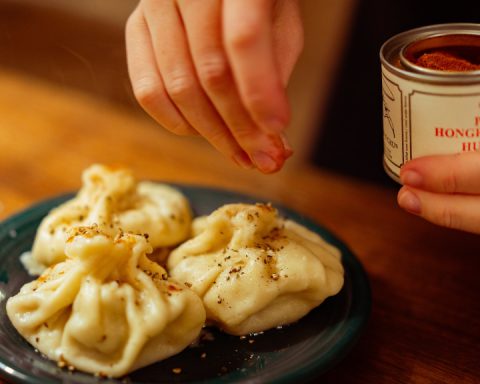
Anna Gorski, owner of Poniatowski, graduate of the Erasmus Mundus Global Studies program, has led a transnational life and gone down different career paths. The 29-year-old native or Racibórz, Poland, first thought continuing on the academic path was the right choice for her. But then one Christmas, a fun break selling Polish delicacies to market-goers in Leipzig awakened a stronger sense of purpose that came to her naturally and helped put things quickly on track: the calling for Poniatowski. Besides the bon vivant spirit of the Polish national hero she named the restaurant after, she channeled her Polish relatives’ cooking, which she’d always craved, and has since turned her dream into Leipzig’s only Polish restaurant. Poniatowski now regularly hosts a variety of cultural events and has even developed its own vodka brand, Stiller Josef, which you can find on-site. Her former University of Leipzig colleagues come to see her regularly these days, and throw parties for their conferences and departments there. A few weeks ago, the outgoing, captivating Anna – always smiling when I see her, even with a huge pile of orders to take care of and contacts to meet – gave me a generous slot within her super-hectic schedule to tell us, via this Q&A, how it all materialized and how it has kept progressing despite obstacles…
Q: So, Anna, when did you open Poniatowski?

A: I opened Poniatowski with my friend Anna Ignerowicz in September 2013. But later she got pregnant and wanted to start a family, so she sold her part of the restaurant to Thomas Zelek [the current business partner].
Q: Why is the restaurant called Poniatowski?
A: I had a dream where I saw him, and also I was telling somebody, I have this bar Poniatowski. And I like so much how it sounds; it sounds Polish but it’s also connected to Leipzig. Then I started to dig deeper, who was he actually. So there’s this Poniatowski plaque on the Waldstraßenviertel because he died in the Elster River after the Battle of the Nations, he was fighting with Napoleon, he had made him marshal. So Józef [Poniatowski], he was actually born in Vienna, in the Palais Kinsky. His father died very early when he was, I think, four years old and his uncle was the last elected king of Poland, before Poland was divided. He took the little Józef with him to Warsaw. And in Poland he became a national hero; in front of the presidential palace in Warsaw there is Poniatowski, on this horse, and at the Wawel Castle there is also Poniatowski. He died here when he was 50 years old, he’d been quite engaged politically, but before that he had lots of ladies, because he was quite handsome for his time. He never got married, he had some illegal kid on the side. And he was throwing lots of parties near Warsaw. But at some point he became more serious. When Poland was partitioned, there was still a tiny autonomous zone, and Poniatowski decided to fight on the side of Napoleon to still have a little hope for this area [against the Russians]. He was still a crazy guy. At some point, when he was already quite high in the military, he drove a carriage naked carrying some important people through Warsaw.
Q: Can you tell me how the idea to open the restaurant came about?
A: I guess the very first idea must have been around 2011, when my husband Peter and my friend Anna Ignerowicz decided to do the Christmas Market at Werk 2. Just to get away a little bit from our regular jobs at that time. And we were just selling bigos, Polish vodka, Polish beer. We had fun. And next year, summer, I was sitting with Anna at the Poniatowski plaque, because we were both living in the neighborhood back then, drinking wine, talking, let’s open a bar. It was a coincidence that we happened to be sitting there. We had decided, okay, we could both do something else with our professional lives. We asked ourselves when was the last time we’d had fun and earned money at the same time, and we discovered it had been at the Christmas Market. It’s one of those ideas when after two weeks you ask yourself if you still wanna do it, and the answer was “yes, yes, yes,” so we decided to do it together. We didn’t have any location, we didn’t have any money, but we said, okay. So get that: I’m sitting in the sauna and there’s this one older guy who comes over to me, and we start talking auf Deutsch. Of course, he hears my accent, asks where I’m from, I say I’m from Poland. He tells me one of his relatives knows somebody also from Poland. Then he says, “I have this book at home but it’s in Polish, I don’t understand it, but it’s a very nice old book, I should bring you this.” I say, “Yeah, that will be nice, thank you” – it could be any book. I didn’t tell him anything about bar or Poniatowski. Two days later, he calls me over to his car, opens the trunk, and hands over to me a book from 1913 – a hundred years after the Battle of the Nations – made in leather, hand-printed… the biography of Józef Antoni Poniatowski! He tells me, “It’s more useful for you than it is for me.” So in 2013 I got the book, 200 years after. I thought, this is a sign, I can’t ignore it.
Q: How did you go from being a PhD candidate to owning a restaurant, is this something you’ve always thought about?
A: When I graduated from Global Studies, I was doing an internship at the Polish Institute, involved in preparing their cultural events and some catering, and I realized how much I missed Polish food. I had been organizing some pierogi nights; each two or three months, with my classmates, we’d meet at my place and drink Zubrówka and make pierogi together. In the end, [Poniatowski] was a better solution for me, meeting people at the restaurant rather than only at the library. I think it’s a matter of personality – working in a restaurant is a totally different approach, also in terms of schedule, you have to work nights. Sometimes I ask myself, would I go back to university, and the answer is no, I’m still quite happy about my choice. The funny thing is, after I told my parents about the restaurant idea – I just informed them – showed them the Web site, the crowd-funding, that we had the location already, my dad said, “Just like your great-aunt.” Turns out the sister of my granny had been the head chef at a big hotel in Zakopane. I didn’t know about it before. It was like, why not follow the footsteps of your ancestors you’ve never met in your life, but still, there was maybe something to it, the sense of, I can pull it off. That was quite reassuring, I have to say, it was quite nice. They’ve been from the beginning very supportive, they just kept asking me, are you sure?
Q: How did you find the place?
A: The place was found online by my husband Peter, he’d been screening through different sites. He said, “I found this big place. The rent looks quite ok. Let’s have a look at it.” We were lucky. The basement was exactly what we had in mind; you have the restaurant, and then you have a space for yourself donwstairs, for some parties, for some cultural events.
Q: Did you get any help from the city, within the framework of revitalizing certain areas of the city? (Poniatowski is located at Leipzig east, Kreuzstraße 15.)
A: No. The funny thing is that actually the Kreuzstraße used to be a very, very lively street. There were in the past quite a few shops and restaurants on that street,
there was an ice cream place where kids from the school would always go. Then after the change [from the GDR], the places went out of business and were replaced by lofts. They were nice pricey lofts and the people were enjoying their quiet street… until we showed up. And now businesses are slowly starting to come back. But on
this street, there is always some construction work being done. We opened in September, and in October the entire street was closed for a month. To be honest,
January and February 2014 were really tough. People walk their own paths in the neighborhood and they don’t notice the restaurant is here. But then there was the first Kreuzstraßenfest in September 2014, and that was really nice, because the neighbors came, the regular customers came, families came, and it was also our one-year celebration.
Q: How did you gather the funding for your project?

A: Basically, we needed crowd-funding because we needed some starting capital. We wrote a business plan and got together all the documents you need to apply for the loan. For that we used the SMILE scheme, for Uni Leipzig graduates; for five years after your graduation, you have access to their seminars and programs. So for 10 days in February 2013, we had meetings with some bankers, with some lawyers, with some investment people, and they were helping us with how to implement our business strategies. This program helped us write a proper business and investment plan, and they helped us send this whole project to the guy they knew from Sparkasse, who’s responsible for the loan applications.
Q: Can you tell me a little bit about how you used social media for crowd-funding?
A: We needed 10 to 15 percent of our own input, from the entire sum. We were struggling at first over whether we should use, let’s say, some of the big crowd-funding platforms. I must say that I was a bit skeptical that it would be successful, because I had the impression all the projects there were very social, very admirable causes. And I thought, oh my gosh, I want a bar and a restaurant. For the cultural dimension we had planned for the basement space, bringing more Slavic cultural initiatives to Leipzig, that might even work out, but I thought first, let’s just try to reach out to the people we know. So I set up a blog on the Blogspot site for Poniatowski and I did a Facebook event, where I really wrote a love letter, it was really long but came straight from the heart. We sent e-mails to people, and they started to share, share, share, share. They would buy themselves vouchers for 50 euros for food and drinks at our restaurant before we even started to exist. This lasted six weeks, the entire April and part of May [2013]. It was so empowering. We really collected this 5,000 euros [we needed]. Most of the people we knew or had heard of. Also our family was a big support. People from all over the world were donating, also because of Global Studies; my friends from the program donated from India, from New York, from Australia. It was really nice, really reassuring that, ok, they have my back. They transferred money to our private account, because we didn’t even have our own account yet; it was a really strict deadline for when this money had to be in the account in order for us to get the loan. I would give them regular updates on the status of the money and write thank you notes. Around 50 percent of the people who contributed have come to visit Poniatowski. They’re usually very emotional, very touched, everybody was quite impressed, I have to say; they were like, “oh my gosh, you really pulled it off.” We did the physical work, painting and installing things, in just six weeks. I came back from holidays in Poland and said, ok, let’s do this bar. Now when I think about it, it was a mad move, what we did.

Q: What’s the value added by having cultural events at Poniatowski?
A: I think it’s tremendous. I cannot imagine Poniatowski without the cultural events. From the beginning, we envisioned that it could not be a place where you’d “just” eat and drink, that we’d also like to be a hot spot for people to share ideas, chill out and listen to some interesting poetry or reading or watch a movie together, or listen to good music. I think this is at least 50 percent of the entirety of Poniatowski’s activities. Poniatowski’s regular events include the Leipzig Writers’ open mic and the Deutsch-Polnischesr Literatursalon, the latter supported by Stadt Leipzig. There are also live music concerts at least once a month.


